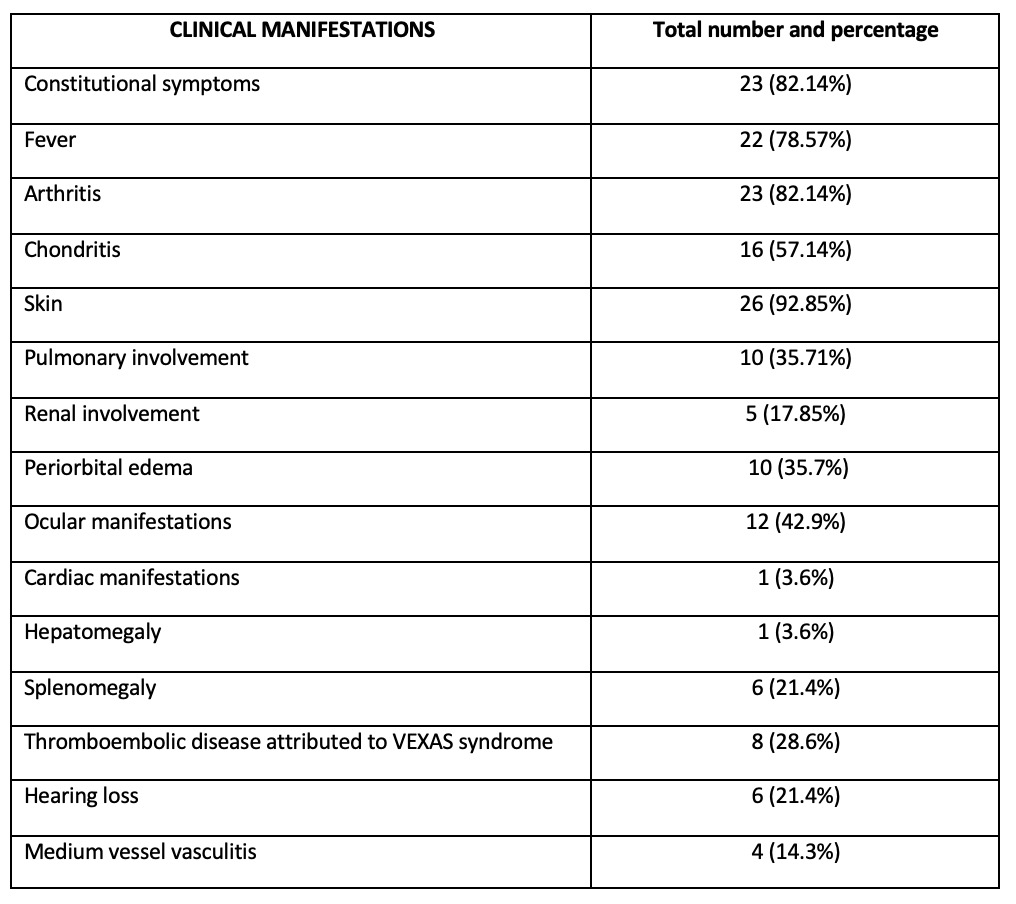Session Information
Date: Monday, November 13, 2023
Title: (1124–1154) Miscellaneous Rheumatic & Inflammatory Diseases Poster II
Session Type: Poster Session B
Session Time: 9:00AM-11:00AM
Background/Purpose: The newly described VEXAS syndrome is a very heterogenous disease with rheumatologic and hematologic manifestations, caused by somatic mutations affecting UBA1 gene, that still requires a precise definition. Our objective was to describe the clinical profile of VEXAS patients (VP) diagnosed and monitored in rheumatologic units in Spain.
Methods: A comprehensive survey covering the whole country, which included 126 Spanish hospitals with rheumatologic units, was performed to identify all the VP observed in those units. VP were defined as compatible clinical picture plus characteristic BMB and/or confirmed UBA1 gene mutations. Demographic, clinical, laboratory and outcome data were collected from medical records. Descriptive analyses were performed employing standard tests.
Results: A total of 28 VP were identified. All of them were men and had a Caucasian origin, with a mean age at diagnosis of 70.96 (±SD 8.92) years. Constitutional symptoms and fever were detected in 26 (92.85%) patients, while arthritis was present in 23 (82.14%) of them, and chondritis (including nasal chondritis, perichondritis and epiglottis’ chondritis) was found in 16 (57.14%) cases. Twenty-six (92.85%) patients presented 1 or more skin manifestations, being the most frequent ones: Sweet syndrome (n=18, 64.28%), leukocytoclastic vasculitis (n=8, 28.57%), erythema nodosum (n=3, 10.71%), Jessner’s lymphocytic infiltration of the skin (n=2, 7.14%), and lupus-like skin lesions (n=2, 7.14%). Pulmonary involvement was found in 10 (35.71%) cases; patients presented 1 or more findings, including lung infiltrates (n=5), interstitial lung disease (n=5), pleurisy (n=2), and alveolar hemorrhage (n=1). It is worth remarking the finding of renal involvement (acute renal failure n=3, IgA nephropathy n=1, nephrotic syndrome n=1) attributed to VEXAS syndrome in 5 patients out of 28 (17.85%), complication which has not been previously described in other studies to our knowledge at the time of this publication. Other clinical manifestations are included in Table 1. Anaemia was found in 27 (96.42%) cases, being macrocytic in 22 of them; 19 (67.85%) presented thrombocytopenia as well; furthermore, 18 (64.28%) met criteria for MDS. Other laboratory findings are included in Table 2.
Conclusion: The clinical manifestations identified within our cohort of VEXAS syndrome, focusing on the rheumatologic aspect, exhibit similarities to those previously documented in this condition. However, a noteworthy observation in our study is the presence of renal involvement attributed to VEXAS syndrome in nearly 20% of our patients. This complication has not been reported in previous studies, as far as our knowledge extends at the time of this publication.
To cite this abstract in AMA style:
López I Gómez M, García Escudero P, López M, Magallanes López B, Salles Lizarzaburu M, Frade Sosa B, Riera E, Trallero Araguás E, DIEZ ALVAREZ M, Toyos Sáenz de Miera F, Garcia Dorta A, Hernández Beriain J, Ibáñez Martínez M, Merino c, VELA P, Orenes Vera A, Dios Santos D, Miranda Filloy J, García Belando C, Rodríguez Laguna M, Vázquez I, Belzunegui J, Font J, de Miguel Sánchez C, Ortiz de Zárate Caballero Z, Calvo Alén J. A Rheumatologic Clinical Profile of the VEXAS Syndrome: Results from a Survey Conducted Among Rheumatologic Units of 126 Hospitals Across Spain [abstract]. Arthritis Rheumatol. 2023; 75 (suppl 9). https://acrabstracts.org/abstract/a-rheumatologic-clinical-profile-of-the-vexas-syndrome-results-from-a-survey-conducted-among-rheumatologic-units-of-126-hospitals-across-spain/. Accessed .« Back to ACR Convergence 2023
ACR Meeting Abstracts - https://acrabstracts.org/abstract/a-rheumatologic-clinical-profile-of-the-vexas-syndrome-results-from-a-survey-conducted-among-rheumatologic-units-of-126-hospitals-across-spain/


